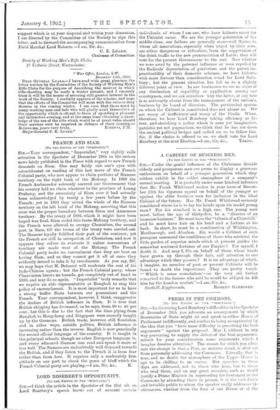FRANCE AND SIAM.
[TO THE EDITOR OF THE "SPECTATOR."]
SIR,—Your correspondent, "Imperialist," very rightly calls attention in the Spectator of December 28th to the serious news lately published in the Times with regard to new French demands on Siam. One may fairly rub one's eyes with astonishment on reading of this last move of the French Colonial party, who now appear to claim portions of Siamese territory on the right bank of the Mekong. In 1889 the French Ambassador solemnly assured our Government that his country laid no claim whatever to the province of Luang Prabang, and the suzerainty of Siam over it had actually been acknowledged by treaty a few years before by the French ; yet in 1893 they seized the whole of the Siamese territory on the left bank of the Mekong, asserting that this river was the proper boundary between Siam and Annamese territory. By the treaty of 1893, which it might have been hoped was final, Siam ceded this trans-Mekong territory, and the French were allowed to occupy Chentabun, the second port in Siam, till the terms of the treaty were carried out. The Siamese loyally fulfilled their part of the contract; yet the French are still in occupation of Chentabun, and now it appears they refuse to evacuate it unless concessions of territory are made west of the Mekong. The French Colonial party make no concealment that they are bent on having Siam, and as they cannot get it all at once they evidently intend to take it by instalments. As you say, Sir, we may hope that M. Delcasse will moderate the zeal of his Indo-Chinese agents ; but the French Colonial party, whose Chauvinism knows no bounds, got completely out of hand in 1893, and may do so again. " Imperialist" truly remarks that we require an able representative at Bangkok to stop this policy of encroachment. It is most important for us to have a strong buffer State between our possessions and the French. Your correspondent, however, I think, exaggerates the decline of British influence in Siam. It is true that British shipping has decreased, as he says, from 90 to 40 per cent., but this is due to the fact that the lines plying from Bangkok to Hong-kong and Singapore were recently bought up by the Germans. British trade, however, still flourishes, and in other ways, outside politics, British influence is increasing rather than the reverse. English is now practically the second official language of the country. It is taught in the principal schools, though no other European language is, and every educated Siamese can read and speak it more or less well. The Siamese are undoubtedly well disposed towards the British, and if they listen to the French it is from fear rather than from love. It requires only a moderately firm attitude on our part to check the game of bluff which the French Colonial party are playing.—I am, Sir, &c., K.






































 Previous page
Previous page